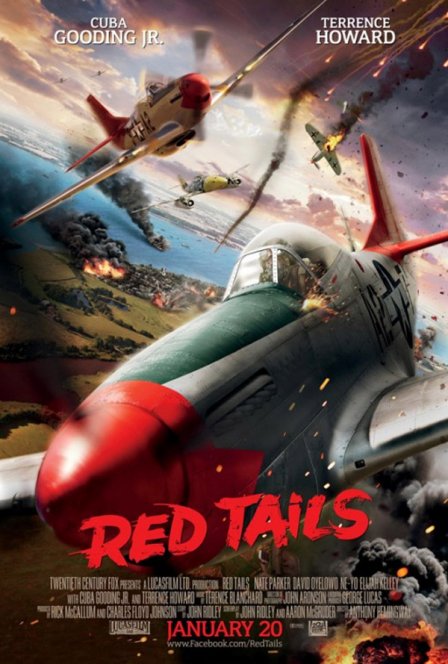Somewhere between an episode of Family Matters (most obviously the one in which Grandma Winslow told Eddie all about the time his deceased grandfather flew with The Tuskegee Airmen) and the 1995 PBS made-for-TV movie The Tuskegee Airmen lies Red Tails. This yet-another-tribute-to-the-black-pilots-of-WWII feels like everything you’ve seen or heard before on the subject, only with a decidedly more television-sitcom feel. I don’t mean to be mawkish by comparing it to a popular “black” sitcom, but there’s no getting around the fact that Red Tails is the feature-film debut of a director and a screenwriter seasoned in television, and it shows.
Man-to-man confrontations, on the ground and in the air, between two ace Tuskegee pilots, Easy (Nate Parker) and Lightning (David Oyelowo), make up the bulk of the story. The rest is made up of whether these two or any of the rest of the Red Tails (the black pilots paint their planes red to make them stand out) are successful flying their missions against German jets. The tricks screenwriter John Ridley (who wrote most of The Wanda Sykes Show and also once did the story for, and fought with David O. Russell over, Three Kings) has in his bag are boiled to black/white simplicity — Easy likes to drink and do things by the book; Lightning is a womanizer who flies by his own rules — and none of the history of what was apparently a Navy experiment, allowing black men to fly, comes through. The whole thing is shot without rhythm by CSI:NY/The Wire vet Anthony Hemingway. Most scenes — even the ones in the air, when the pilots should be focusing on protecting bombers and shooting Nazis — are centered around one character learning a lesson from another. It’s as if each of the movie’s sequences were given a theme on which to expound and then followed the basic prescription for expounding, the same way that the most unimaginative sitcoms find it easier to preach their topics rather than lay them out dramatically.
Red Tails was financed, and much touted, by George Lucas. You could say it has the ultra-simplistic take on mass conflict that Lucas gave to Star Wars. You couldn’t say that it has any grit or feel for either the terror of being a soldier or the horror of seeing a war. Everything generally felt in movies (especially war movies) is either simply explained in brief A-B dialogue scenes (including scene after tiring scene in which Terrence Howard stares daggers at the racist military brass and affirms the hard-won mettle of his flyboys) or with air battles so clearly created inside Lucas’ computers that there’s no hope of getting lost in their action. It touches only lightly on what it must have felt like to be doubly expendable, as both a wartime soldier and a black man. Both of these aspects, which together amount to the whole human potential of the movie, are reduced to bizarrely affected scenes (full of interminable pauses and bewildering causes for consternation) and Ridley’s awful dialogue (From an attacking Nazi pilot: “Die you foolish Africans!” Advice from a veteran Tuskegee airman to a rookie: “Any pilot who tells you he ain’t scared is either lying or he’s a fool.” Shouted by an ace pilot after he bombs a German ship: “How you like that, Mr. Hitler?!”) Altogether, this is hands-down the rosiest look at WWII I can think of, a fact that seems all the more ridiculous given that, if it had accepted the challenge of compounding the violence of battle with the violence of racism, it might’ve been the darkest.

